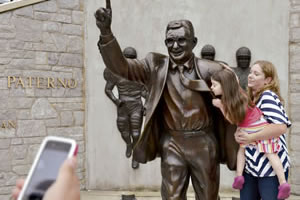Scandals: The Result Of Officials’ Inaction

Jenni Kahler and daughter Emma, 4, have a photo taken with the statue of Joe Paterno outside Beaver Stadium in State College, Pa., two days before it was removed. AP photo by John Beale
For many UH fans, the most hopeful reaction to the controversy surrounding the alleged Stevie Wonder concert at the Stan Sheriff Center was that, at least, we are not Penn State.
While not even the darkest days in UH athletics history rank remotely close to what happened in State College, Pa., the attitudes that produced such events are alive and well, and not just in the state named for William Penn.
In a letter to the editor in the Star-Advertiser, a reader provided a local voice to the problem. The author, whose identity is irrelevant because the opinion expressed is not unique (nor is the letter referenced to chastise a single individual), feels further punishment of UH’s three alleged drunk drivers would have a negative impact on the innocent.
“I’m confident all UH sports figures are now fully aware of the severity and consequences of drinking and driving. More restrictions leveled on the players now would only serve to further punish the remaining innocent ones – coach, team and the public. Thought should be given to imposing no more restrictions but instead substituting some public service with the caveat that in the future, if any student-athlete representing UH is found guilty of DUI, it would result in immediate suspension from university sports. Let’s not distribute more bad feelings now – let’s play ball.”
By now we are all well aware of the phrase and paraphrased version of Edmund Burke’s pronouncement that evil happens when good men do nothing. And while sports apparel makers and well-heeled boosters funnel millions into athletic departments for their own self-interests, the good have sat idly by watching the disintegration of both athletics and education.
The cesspool that is major college athletics is not the fault of Jerry Sandusky, it is ours. We let it happen by doing nothing.
It begins easily enough. We separate the able-bodied from their weaker classmates and champion their physical abilities, sometimes before high school.
Million-dollar coaches, in a desperate attempt to maintain residency in favored ZIP codes, soda-and-dine 17-year-olds in annual displays of ever-greater social segregation.
Once on campus we let athletes register early for classes, often without suffering the indignation of waiting in line for textbooks, and enjoying specially designed meals, as if their time and nutritional needs are any more important than a student whose gifts are more academic than athletic.
We look the other way at boorish, and sometimes illegal behavior, with the condescending rebuttal that the offenders are just kids making mistakes. That they are critical to on-field success is rarely ever mentioned.
Despite free tuition and fees that have reached the average annual salary of most Americans, we discuss at length the notion that student-athletes should be paid for their services.
According to the U.S. Census Bureau, median personal income was $40,584 in 2010. Costs for an incoming freshman at Penn State this fall are $40,016 a year.
For the record, student-athletes graduate at a higher rate than their non-athletic counterparts, and we know enough about college alcohol and drug use to understand that the three previously mentioned football players are not the only students on the Manoa campus to have partaken in such stupid behavior.
The difference is that we don’t publish the math major’s indiscretions. We also don’t excuse them with letters that begin with “Since no one got hurt …”
No matter the will of the majority, 73 percent of ESPN SportsNation poll respondents now favor NCAA sanctions against Penn State, a meteoric shift toward an enlightened era of university athletics is unlikely. Why? Because the win is too important.
Phil Knight’s $68 million investment in Oregon’s new football operations center will be matched elsewhere, as other schools soon realize their coaches need hot tubs with waterproof video equipment. We’ll rationalize it by saying such things must be done to remain competitive.



